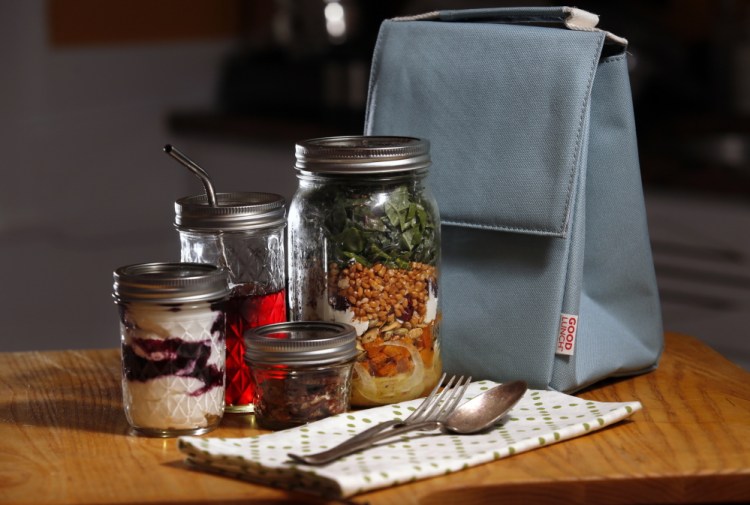According to the New York State Department of Environmental Conservation, the average brown bag lunch in America generates 4 to 8 ounces of garbage. Disposable sandwich bags, potato chip bags, yogurt containers, plastic forks and straws, even the paper bag in which the lunch traveled to school or work get tossed in the trash by early afternoon. That can amount to more than a pound of trash per eater per week.
Carrying a reusable lunch box is hardly a new concept, but in recent years a cottage industry has grown up to provide greener food carriers made from recycled metals, organic cotton and hemp. Likewise, manufacturers and crafters sell washable, cotton food pouches and Velcro-hitched oilcloth wraps to help contain messier items in place of plastic wrap or aluminum foil.
I’d argue, though, that you can assemble a truly waste-free lunch by taking a closer look around your kitchen for items that can be repurposed to do the job. Use the mismatched forks and spoons lying in the back of the silverware drawer to replace plastic utensils and try a BPA-free water bottle for your child’s beverage instead of packing a juice box. Ditch paper napkins for cloth ones, which can be tied with a piece of string to keep a slice of local bread fresh. Keep packaging in mind when you shop, too: Buy foods in bulk and look to items that require no packaging in the first place – apples, bananas and local (hard-boiled) eggs.
My favorite reusable lunch-packing item is a Mason jar, a collection of them, actually. Wide-mouthed quart jars hold composed salads (see recipe below) with old-fashioned charm. Narrow-mouthed quart jars transport morning smoothies without spillage and double as water glasses later in the day. Pint jars are great for soups, and with the metal cap removed, can go straight into a microwave to heat the contents. Half-pint jars hold a portion of yogurt with headroom for fruit or crunchy granola. And 4-ounce jars are perfect for a handful of nuts.
I snake a cloth napkin between the jars for transport so they don’t knock against each other. Or I employ a reusable bag I picked up at a wine store that has upright pockets inside to hold the jars in place.
For more ideas, go to www.wastefreelunches.org.
FALL MASON JAR SALAD WITH GRAINS AND GREENS
To prevent the dressing from soaking your greens by lunch, put it at the bottom of the jar, followed by harder, non-absorbent vegetables or fruits that need a little acid to keep from oxidizing. Layer in cooked whole grains and legumes and cheese, nuts and berries. Finish the packing job with greens just before you tighten the lid. This salad will keep in the refrigerator for 2 to 3 days; you can make the vinaigrette ahead. You’ll need roasted squash, pre-cooked grains and 4 wide-mouthed Mason jars with lids and rings to make this recipe.
Makes 4 salads
Vinaigrette:
3 tablespoons balsamic vinegar
1 tablespoon maple syrup
1 tablespoon minced shallot
1 teaspoon Dijon mustard
½ teaspoon kosher salt
¼ teaspoon ground black pepper
¼ cup canola oil
¼ cup olive oil
Salad:
1 fennel bulb, sliced thinly
1 tart apple, sliced thinly
2 cups roasted butternut squash
1 cup roasted, salted pumpkin seeds
4 ounces fresh goat cheese, crumbled
½ cup dried cranberries
2 cups cooked barley, farro or wheatberries
8 cups chopped Lacitino kale, rainbow Swiss chard or spinach
To make the dressing, whisk together the vinegar, maple syrup, shallots, mustard, salt and pepper. Combine the oils in a measuring cup. Drizzle the oil into vinegar mixture while whisking briskly until the mixture has emulsified into slightly thickened vinaigrette. Divide the vinaigrette equally among the jars.
To make the salad, toss the fennel and apples together in the bowl you used to make the vinaigrette. Divide those among the jars atop the vinaigrette. Next layer ½ cup of roasted squash in each jar followed by ¼ cup pumpkin seeds, 1 ounce goat cheese, 2 tablespoons cranberries and ½ cup cooked whole grains. Pack 2 cups greens in each jar. Leave 2 to 3 inches of headroom in each jar. Refrigerate until ready to use.
To eat, give the jar a really good shake and dig in.
Send questions/comments to the editors.


